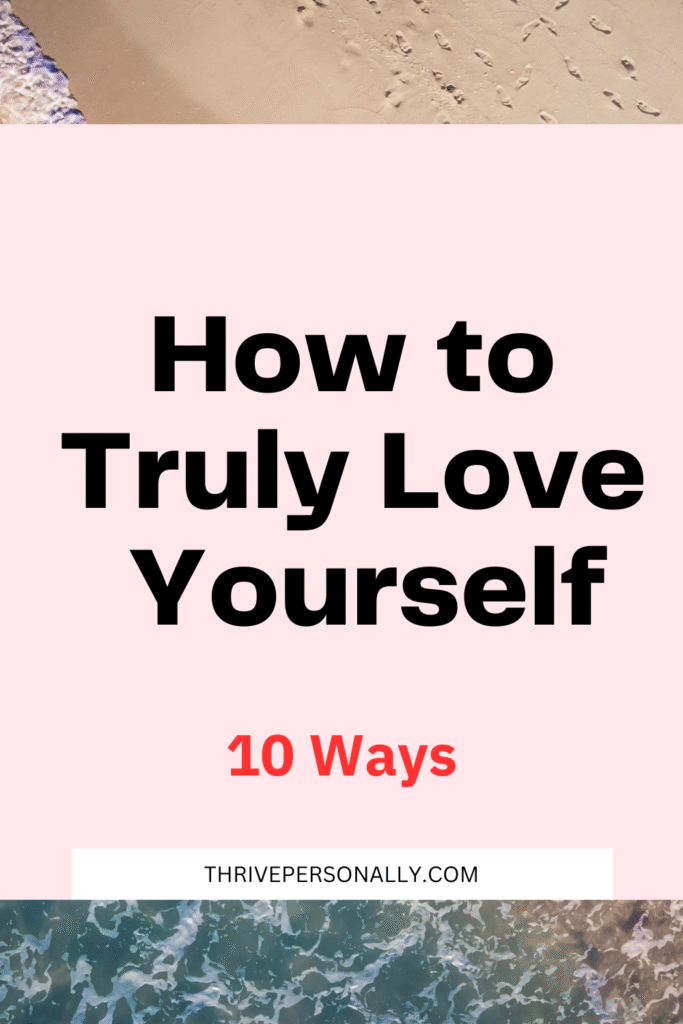The truth is, self-love is not just a nice word for social media. It’s a lifestyle. It’s the choice you make when no one is watching—the way you speak to yourself in your own mind, and the way you treat your own needs. Without it, you’ll keep seeking value from sources that can never truly give it. Loving yourself sets the standard for how the world treats you.
Here are ten things you can start practicing so you can truly love yourself and live from a place of real value.
1. Accept Yourself as You Are
To love yourself, you must first accept yourself as you are today—not when you lose weight, get a promotion, or fix what you think are flaws. If you only allow yourself to feel good after meeting certain goals, you will never be fully comfortable in your own skin.
Your worth is not tied to what you achieve, but to the simple fact that you exist. Self-acceptance means embracing both your strengths and weaknesses. It’s not about hiding your flaws but understanding they are part of your humanity. Growth should come from love, not from self-rejection.
Read also: 50 Practices of Self Love to Transform Your Life
2. Speak to Yourself Kindly
The words you say to yourself shape how you see yourself. When you constantly repeat harsh or negative thoughts, you strengthen the belief that you’re not good enough. Imagine being criticized all day by someone else—now imagine you are the one doing it to yourself.
Pay attention to your self-talk. When you catch yourself thinking something cruel, stop and replace it with something kinder. Over time, kind self-talk will rebuild how you view yourself.
Read also: 150 Powerful Affirmations to Embrace Your Beauty
3. Protect Your Energy with Boundaries
Loving yourself means knowing your boundaries and respecting them. When you allow others to repeatedly cross those boundaries, you signal to yourself—and them—that your needs don’t matter. This often leads to burnout, resentment, and loss of self-respect.
Boundaries can involve your time, your emotions, or your physical space. They might mean saying “no” to things that drain you, even if others expect a “yes.” They might mean limiting contact with people who bring negativity. Protecting your energy proves that you value your own well-being.
Read also: How to Set Boundaries to Protect Your Energy – 5 Tips
4. Forgive Yourself for the Past
You cannot truly love yourself if you keep punishing yourself for mistakes you can’t change. Carrying guilt and shame for years becomes a heavy burden. Remember, mistakes are tools for learning. You are not the same person you were when you made them.
Forgiveness doesn’t mean ignoring wrongs—it means learning from them and releasing the constant self-blame. Forgiveness is a gift you give yourself so you can move forward.
5. Take Care of Your Body
Your body is your lifelong home. The way you care for it reflects how much you value yourself. Neglecting your health sends the message that you don’t deserve care.
Caring for your body means getting enough rest, eating nourishing foods, staying active in ways that don’t cause pain, and keeping up with regular medical checkups. Physical and mental health are deeply connected, and research shows they influence each other strongly (source). When your body is cared for, your mind benefits too.
6. Stop Comparing Yourself to Others
Comparing yourself to others quickly makes you forget your own value. The more you compare, the less you appreciate your own growth. You’re often comparing your behind-the-scenes reality to someone else’s highlight reel—this is not fair to yourself.
Instead of asking, “Why am I not like them?” ask, “How can I be the best version of me?” Focusing on your own journey will make you feel more secure and confident.
7. Make Time for Joy
It’s hard to love yourself if you never give yourself the chance to enjoy life. Responsibilities are important, but life is more than tasks. You need time for hobbies, activities, and experiences that make you feel alive.
Doing things you love reminds you that you are worth joy. It also recharges you mentally and emotionally. Research from Harvard Health shows that enjoyable activities reduce stress and lift your mood. Even a little joy can change how you feel about life—and about yourself.
8. Choose the Right People Around You
Your self-image is influenced by the people you spend the most time with. If they are critical, negative, or disrespectful, it’s harder to love yourself.
Choose relationships that are positive, respectful, and supportive of your boundaries and growth. You don’t have to keep unhealthy relationships just because of history or obligation. Loving yourself means letting go of people who harm your peace and surrounding yourself with those who celebrate you.
9. Be Honest with Your Feelings
Pretending you’re fine when you’re not shows that you don’t feel safe being yourself. Over time, denying your emotions disconnects you from who you are. Loving yourself means trusting your feelings enough to acknowledge and express them.
You don’t need to share everything with everyone, but you should be honest with yourself. If you feel pain, acknowledge it. This builds self-trust, which is a foundation of self-love. The American Psychological Association emphasizes that acknowledging your emotions is an important part of mental health.
10. Celebrate Every Win—Big or Small
If you only celebrate big achievements, you miss countless chances to feel proud of yourself. Small wins are signs of progress and should be recognized.
By appreciating your efforts, you remind yourself that your actions matter—whether it’s finishing a task you’ve put off or making a healthy choice. Over time, this builds pride and self-worth. Loving yourself means knowing you deserve to be celebrated every day simply for being you.
Final Thoughts
Loving yourself is not a one-time decision—it’s a daily practice. It’s reflected in how you treat your body, the boundaries you set, the words you say to yourself, and the people you allow into your life. It’s in how you respond to failure and how you create joy for yourself.
When you learn to love yourself, the need for constant external validation fades. You feel more confident, more at peace in your own skin, and deeply rooted in who you are. You’ll realize you were enough all along—not because of what you do, but because of who you are.
And when you truly believe that, your whole way of living will change.
Save the pin for later



